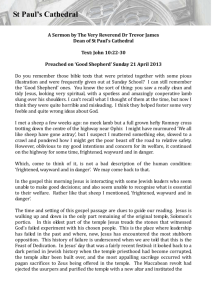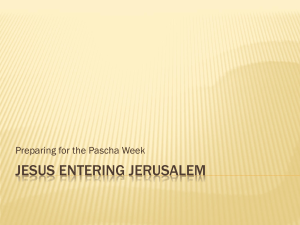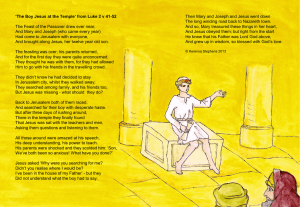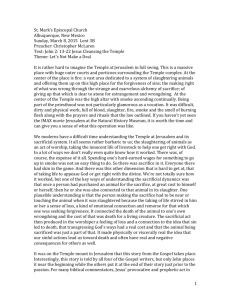3rd Sunday of Lent/B
advertisement
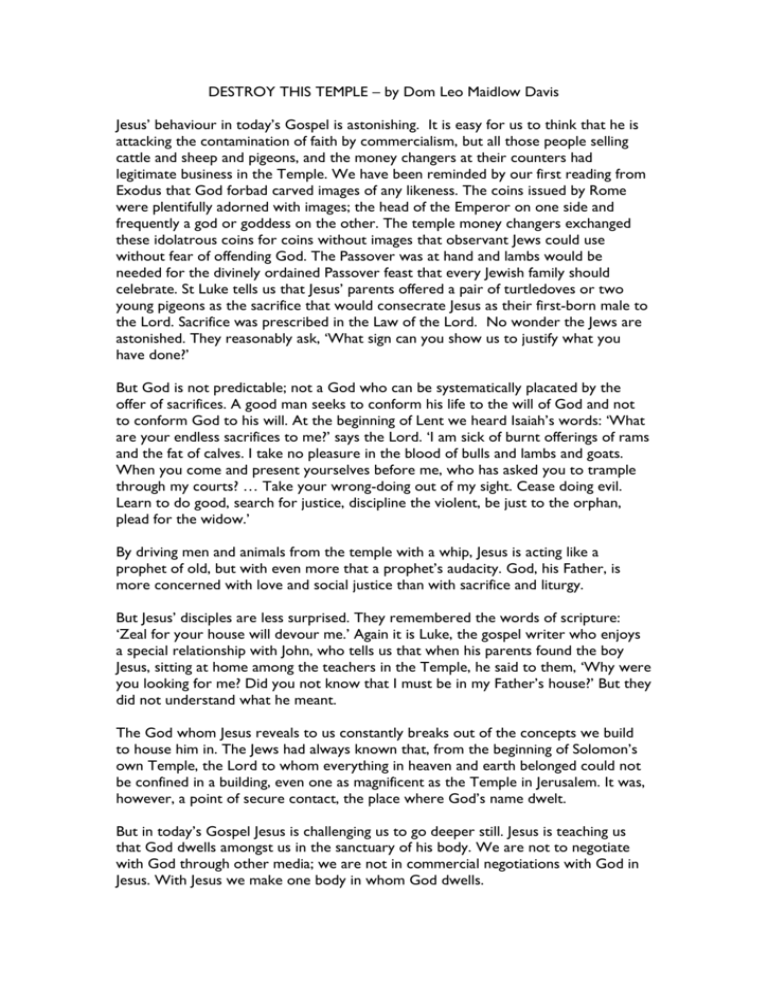
DESTROY THIS TEMPLE – by Dom Leo Maidlow Davis Jesus’ behaviour in today’s Gospel is astonishing. It is easy for us to think that he is attacking the contamination of faith by commercialism, but all those people selling cattle and sheep and pigeons, and the money changers at their counters had legitimate business in the Temple. We have been reminded by our first reading from Exodus that God forbad carved images of any likeness. The coins issued by Rome were plentifully adorned with images; the head of the Emperor on one side and frequently a god or goddess on the other. The temple money changers exchanged these idolatrous coins for coins without images that observant Jews could use without fear of offending God. The Passover was at hand and lambs would be needed for the divinely ordained Passover feast that every Jewish family should celebrate. St Luke tells us that Jesus’ parents offered a pair of turtledoves or two young pigeons as the sacrifice that would consecrate Jesus as their first-born male to the Lord. Sacrifice was prescribed in the Law of the Lord. No wonder the Jews are astonished. They reasonably ask, ‘What sign can you show us to justify what you have done?’ But God is not predictable; not a God who can be systematically placated by the offer of sacrifices. A good man seeks to conform his life to the will of God and not to conform God to his will. At the beginning of Lent we heard Isaiah’s words: ‘What are your endless sacrifices to me?’ says the Lord. ‘I am sick of burnt offerings of rams and the fat of calves. I take no pleasure in the blood of bulls and lambs and goats. When you come and present yourselves before me, who has asked you to trample through my courts? … Take your wrong-doing out of my sight. Cease doing evil. Learn to do good, search for justice, discipline the violent, be just to the orphan, plead for the widow.’ By driving men and animals from the temple with a whip, Jesus is acting like a prophet of old, but with even more that a prophet’s audacity. God, his Father, is more concerned with love and social justice than with sacrifice and liturgy. But Jesus’ disciples are less surprised. They remembered the words of scripture: ‘Zeal for your house will devour me.’ Again it is Luke, the gospel writer who enjoys a special relationship with John, who tells us that when his parents found the boy Jesus, sitting at home among the teachers in the Temple, he said to them, ‘Why were you looking for me? Did you not know that I must be in my Father’s house?’ But they did not understand what he meant. The God whom Jesus reveals to us constantly breaks out of the concepts we build to house him in. The Jews had always known that, from the beginning of Solomon’s own Temple, the Lord to whom everything in heaven and earth belonged could not be confined in a building, even one as magnificent as the Temple in Jerusalem. It was, however, a point of secure contact, the place where God’s name dwelt. But in today’s Gospel Jesus is challenging us to go deeper still. Jesus is teaching us that God dwells amongst us in the sanctuary of his body. We are not to negotiate with God through other media; we are not in commercial negotiations with God in Jesus. With Jesus we make one body in whom God dwells. This is very hard for us to begin to understand. We work so hard at being unique, and we really are loved by God individually, more than we can love ourselves. God has numbered our every hair. But we are not separate and isolated from one another, though often we wish to be. When we turn away from one another, it is our own flesh we are forsaking. The Temple cannot be a home unless all its stones unite; a body does not function until all the parts are in harmony and love each other. God is more concerned with love and social justice than with sacrifice and liturgy. We need to discover that love and social justice, sacrifice and liturgy are not different things, but one thing. It is by entering each day more fully into the risen body of Christ, the Temple of his Body, that we will begin to discover that extraordinary new world. May our dwelling in the Temple of Christ’s Body become more sure this Lent and Easter. Downside Abbey 3rd Sunday of Lent/B 15th March 2009



